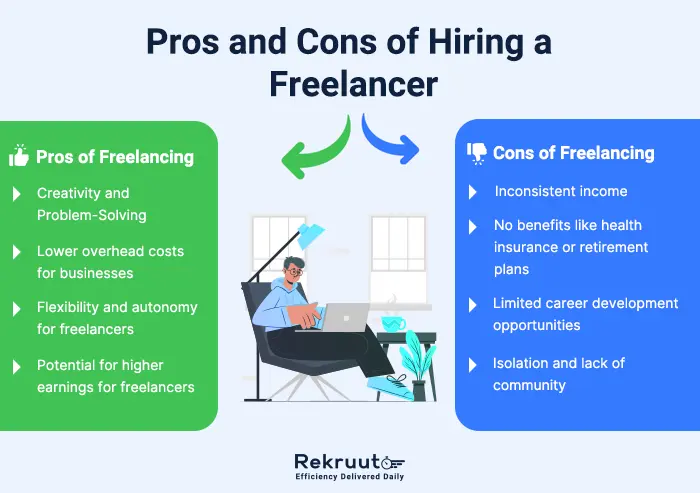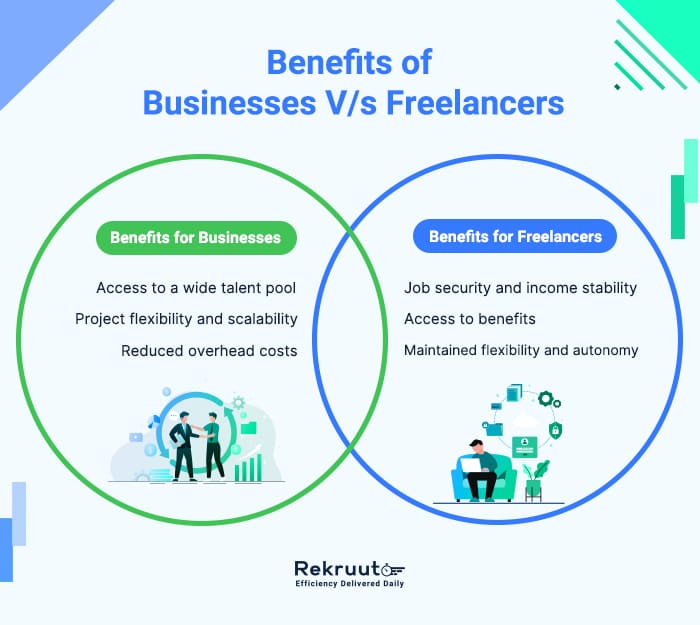The world of work is undergoing a dramatic transformation. The traditional 9-to-5 office job is no longer the sole option for many individuals. Did you know? In 2023, a staggering 39% of the U.S. workforce reported freelancing in some capacity, according to Upwork. This rise of the freelance economy offers undeniable benefits, particularly flexibility and autonomy. However, the current freelance model often falls short in providing the stability and security desired by many talented individuals.
This blog explores the current state of the virtual assistant economy, its limitations, and the potential of a hybrid work model that bridges the gap between freelance and traditional employment. We’ll delve into the advantages this approach offers for both businesses and workers, ultimately paving the way for a more sustainable and fulfilling work ecosystem.
The Rise of the Freelance Economy
The freelance economy has seen significant growth in recent years, fueled by advancements in technology and an ever-increasing desire for work-life balance. It has opened up a new realm of possibilities, offering several key advantages:

- Benefits for Businesses: Companies can tap into a wider talent pool, unrestricted by geographical boundaries. This allows access to diverse expertise and skills that may not be locally available. Additionally, businesses can significantly reduce overhead costs associated with full-time employees, such as office space, equipment, and benefits. The ability to scale their workforce up or down based on project needs ensures efficiency and cost-effectiveness, making it an attractive proposition.
- Benefits for Individuals: The freelance lifestyle affords a level of flexibility traditional employment often cannot match. Freelancers can manage their own schedules, choosing when and where they work. This can lead to a better work-life balance and reduces the stress associated with commuting. Freelancers also have autonomy over their projects, allowing them to select work that aligns with their skills and interests. The potential for higher earnings is another attractive aspect of freelancing, as individuals can set their rates based on the quality and value of their work.
Despite these benefits, the freelance life comes with its own set of challenges:
- Income Inconsistency: The unpredictable nature of freelance work can lead to periods of feast or famine. This inconsistency in income can result in financial insecurity for many freelancers, making it difficult to plan for the future or manage unexpected expenses. This lack of a steady paycheck is one of the significant drawbacks of the freelance lifestyle.
- Lack of Benefits: Traditional employee benefits such as health insurance, paid time off, and retirement savings plans are often not provided to freelancers. This lack of benefits can leave freelancers vulnerable, especially in times of illness or injury, and can make retirement planning more challenging.
- Limited Career Development: Freelancers may find it more difficult to access training and professional development opportunities that are commonly offered by traditional employers. This can hinder their ability to upskill or reskill, which is increasingly important in a rapidly changing job market.
- Isolation and Lack of Community: Working remotely can lead to feelings of isolation, as freelancers often lack the daily social interaction that comes with a traditional office environment. This lack of community can impact freelancers’ mental health and can make it harder to build professional networks.
Also Read: Hiring a Virtual Assistant for Your Shopify Business: Top Skills and Tasks
The Need for a Remote Approach
The traditional dichotomy of work – full-time employment or freelance – often fails to address the diverse needs and aspirations of today’s workforce. Many individuals are increasingly seeking a blend of the flexibility and autonomy offered by freelance work with the stability and security that is characteristic of a traditional job. This emerging demand necessitates the exploration of a hybrid work model.
Hybrid or remote work models merge aspects of both freelance and full-time work, offering a more flexible and personalized work arrangement that can cater to a range of worker needs. This model can help reconcile the desire for flexibility with the need for security, and it presents several potential solutions that businesses can consider:
- Guaranteed Minimum Hours for Freelancers: To offer some level of income stability, businesses can consider guaranteeing a minimum number of hours per week or month for their freelancers. This approach assures freelancers of a baseline income, helping to alleviate the income volatility that is often associated with freelance work and providing a certain degree of financial stability.
- Project-Based Full-Time Contracts: Another potential solution is to hire full-time talent on a project-basis. This involves offering employees full-time contracts for specific projects, with a defined timeframe and scope. While this still provides workers with the full-time benefits that are traditionally absent in freelance work, it also allows businesses to be more agile and responsive to their project and workforce needs.
- Flexible Scheduling Options for Salaried Employees: Businesses can also consider offering more control over work schedules to their salaried employees. This could involve allowing options for remote work or offering flexible start and end times. Such practices can help businesses retain talent by accommodating the personal circumstances of their employees, and it allows employees to maintain a better work-life balance while still enjoying the benefits of a salaried job.
Benefits of a Remote Work Model
A remote work model combines aspects of both full-time and freelance work, offering a more flexible and personalized work arrangement. It can cater to a wide range of worker needs and provides a win-win situation for both businesses and workers. Here’s a more in-depth look at how:

Also Read: 5 Tasks a Graphic Designer Virtual Assistant Can Do
Benefits for Businesses
- Access to a Wider Talent Pool: Companies can attract skilled individuals who may not be interested in a traditional full-time role but still desire some level of stability. By incorporating a remote work model, businesses can tap into a broader range of talent, increasing their potential for innovation and growth.
- Improved Project Flexibility and Scalability: A remote model allows businesses to leverage both full-time and freelance talent as needed. This flexibility enables businesses to scale their workforce up or down based on project demands, making them more agile and responsive. It also ensures a more efficient utilization of resources, as businesses can bring in additional help during peak times and scale down when the workload is lighter.
- Reduced Overhead Costs: Compared to traditional full-time employee benefits packages, a remote model may offer some cost savings for businesses. Since workers in a remote model may work remotely or part-time, businesses can save on costs related to office space, equipment, and full-time employee benefits.
Also Read: Hiring a Virtual Assistant for Your Shopify Business: Top Skills and Tasks
Benefits for Freelancers
- Increased Job Security and Income Stability: One of the significant challenges of freelance work is the lack of income stability. However, in a remote model, guaranteed minimum hours or project-based contracts can offer a degree of financial security that’s often lacking in traditional freelance work. This blend of flexibility and stability can make the remote model an attractive option for many workers.
- Access to Benefits: Full-time benefits like healthcare and paid time off are often not provided to freelancers. However, in a remote work model, businesses may extend some of these benefits to their part-time or contract workers. This provision can provide peace of mind and a sense of security for workers, promoting their overall well-being and job satisfaction.
- Continued Flexibility and Autonomy: Compared to a traditional 9-to-5 job, a remote model allows workers to maintain some control over their work schedules and location. They can choose when and where they work, providing them with the flexibility to balance their personal and professional lives effectively. This flexibility can lead to increased job satisfaction, improved productivity, and enhanced work-life balance.
Also Read: Virtual assistants powered by AI cannot replace human touch
At Rekruuto, we are committed to fostering a future of work that caters to diverse needs and preferences. Our platform seamlessly connects businesses with freelancers, providing a robust solution for building a hybrid or remote workforce.
Rekruuto’s features facilitate the creation and management of hybrid work arrangements, including:
- Skill-Based Talent Matching: Our platform uses advanced algorithms to match businesses with the perfect talent for their needs, regardless of full-time or freelance status.
- Flexible Job Posting Options: You can create job postings for both full-time and freelance positions, attracting positions, attracting a wider range of qualified candidates.
- Streamlined Communication and Collaboration: Rekruuto provides built-in communication tools for seamless collaboration between full-time employees, freelancers, and internal teams, ensuring project success.
- Project Management Features: Our platform offers project management functionalities to track progress, manage deadlines, and ensure clear communication for all parties involved.
Also Read: AI vs. Human Virtual Assistants: Benefits, Disadvantages, and How to Choose
Conclusion
The future of work is evolving, with hybrid models offering a potent mix of flexibility and security. Businesses adopting this approach can access a wider talent pool, increase project flexibility, and potentially reduce costs. Workers benefit from a balance of stability and autonomy, improving job satisfaction and work-life balance.
As we advance, creating a work ecosystem that caters to diverse needs is key. Remote work models are a promising solution that fosters a flexible and secure future of work, empowering businesses and workers to thrive.
Rekruuto is committed to building a future of work that is diverse and inclusive, by connecting businesses with freelancers and facilitating the creation and management of hybrid work arrangements. Whether it’s skill-based talent matching, flexible job posting options, streamlined communication, or project management features, Rekruuto provides tools that empower businesses and workers in this evolving work landscape.
Ready to build a more dynamic and successful workforce?
Rekruuto can help! We offer a 7 days free trial so you can experience firsthand how our platform empowers you to leverage the benefits of a remote work model.


